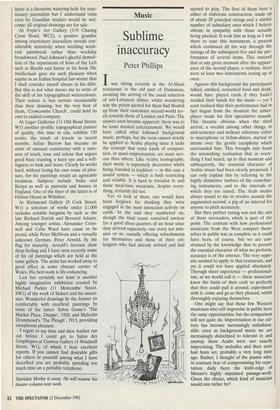Music
Sublime inaccuracy
Peter Phillips
Iwas sitting recently in the Al-Shani restaurant in the old part of Damascus, awaiting the serving of the usual selection of sub-Lebanese dishes, whilst wondering why the prices quoted for them had floated up from their customary second-world lev- els towards those of London and Paris. The answer soon became apparent: there was to be some musical entertainment. We would have called what followed background music, perhaps, but the term cannot strictly be applied to Arabic playing since it lacks the concept that some kinds of composi- tion, or quasi-improvisation, are more seri- ous than others. Like Arabic iconography, their music is supremely decorative whilst being founded in tradition — in this case a modal system — which is both restricting and reliable. It is hard to trivialise it; and these meal-time musicians, despite every- thing, certainly did not.
Yet, to look at them, one would have been forgiven for thinking they were engaged in the most insouciant activity on earth. In the end they numbered six, though the final count remained unclear for a good three-quarters of an hour since they arrived separately, one every ten min- utes or so, casually offering refreshments for themselves and those of their col- leagues who had already arrived and had started to play. The first of them bore a zither of elaborate construction, made up of about 20 principal strings and a similar number of subsidiary ones which I believe vibrate in sympathy with those actually being plucked. It took him as long as I was there to tune this instrument, a process which continued all the way through the tunings of the subsequent five and the per- formance of several items. This ensured that at any given moment after the appear- ance of the second player, a violinist, there were at least two instruments tuning up at once.
Against this background the participants talked, smoked, consumed food and drink, would have played cards if they hadn't needed their hands for the music — yet I soon realised that their performance had in fact begun from the moment the zither- player made his first speculative sounds. This became obvious when the third arrival, a vocalist among other things, in mid-sentence and without reference either to microphone or fellow-diners, started to intone over the gentle cacophony which surrounded him. This brought into focus the astonishing realisation that in every- thing I had heard, up to that moment and subsequently, the essential character of Arabic music had been clearly preserved. I can only explain this by referring to the highly distinctive timbres of the contribut- ing instruments, and to the intervals to which they are tuned. The Arab modes always sound to me to revolve around the augmented second, a pig of an interval for anyone to pitch accurately.
But then perfect tuning was not the aim of these serenaders, which is part of the point. The contrast with how professional musicians from the West comport them- selves in public was as complete as it could have been, of course, but we are con- strained by the knowledge that to present the essential character of what we perform, accuracy is of the essence. The very oppo- site seemed to apply in that restaurant, and yet it could not have applied absolutely. Through sheer experience — professional- ism, as we would call it — these musicians knew the limits of their craft so perfectly that they could pull it around, experiment with it, come and go as they pleased, whilst thoroughly enjoying themselves.
One might say that those few Western musicians who still improvise in public have the same opportunities, but the comparison will not quite do. Improvisation in our cul- ture has become increasingly unfashion- able: even as background music we are increasingly disinclined to tolerate it; and anyway these Arabs were not exactly improvising. The melodies and their texts had been set, probably a very long time ago. Rather, I thought of the pianist who, in constant fear of compromising his repu- tation, daily faces the knife-edge of Mozart's highly stipulated passage-work. Given the choice, which kind of musician would one rather be?


































































 Previous page
Previous page